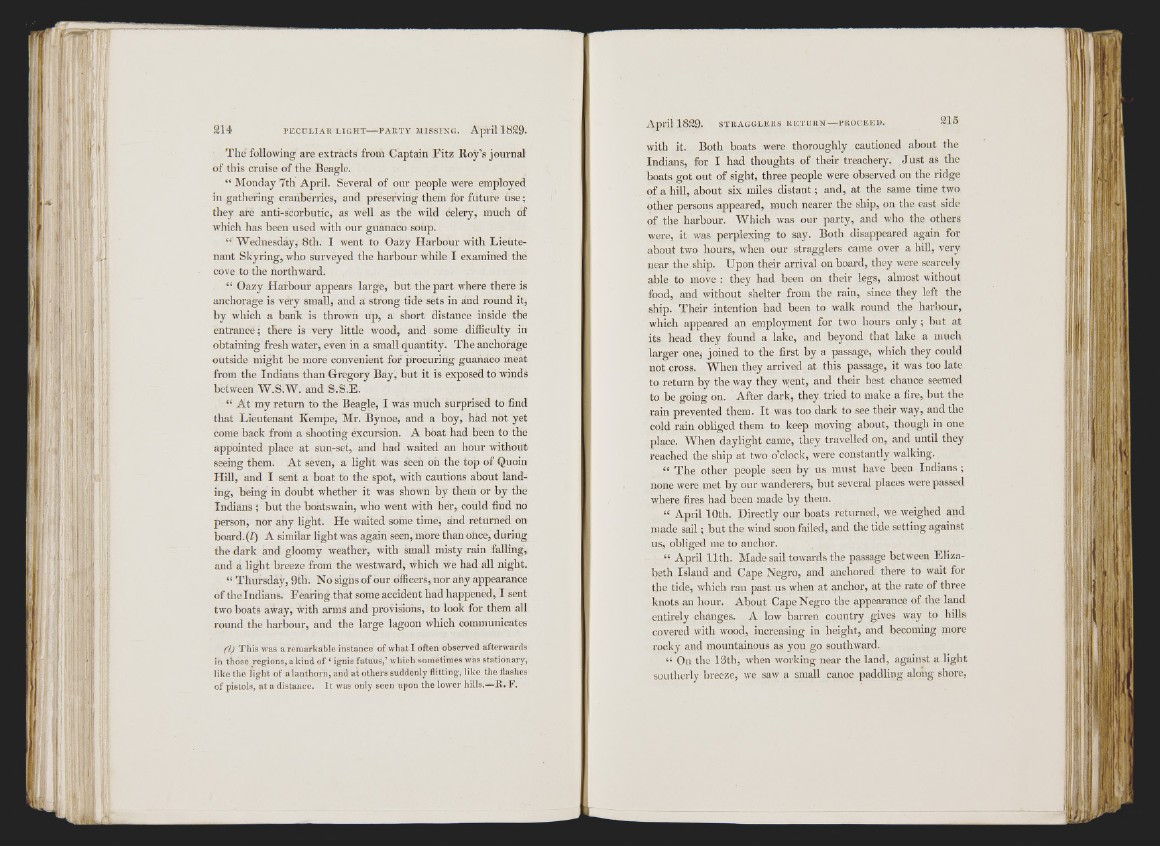
!
i < 1 :
The following are extracts from Captain Fitz Roy’s journal
of this cruise of the Beagle.
“ Monday 7th April. Several of our people were employed
in gathering cranberries, and preserving them for future use;
they are anti-scorbutic, as well as the wild celery, much of
which has been used with our guanaco soup.
“ Wednesday, 8th. I went to Oazy Harbour with Lieutenant
Skyring, who surveyed the harbour while I examined the
cove to the northward.
“ Oazy Harbour appears large, but the part where there is
anchorage is very smaU, and a strong tide sets in and round it,
by which a bank is thrown up, a short distance inside the
entrance; there is very little wood, and some difficulty in
obtaining fresh water, even in a small quantity. The anchorage
outside might be more convenient for procuring guanaco meat
from the Indians than Gregory Bay, but it is exposed to winds
between W.S.W. and S.S.E.
“ At my return to the Beagle, I was much surprised to find
that Lieutenant Kempe, Mr. Bynoe, and a boy, had not yet
come back from a shooting excursion. A boat had been to the
appointed place at sun-set, and had waited an hour without
seeing them. At seven, a light was seen on the top of Quoin
Hill, and I sent a boat to the spot, with cautions about landing,
being in doubt whether it was shown by them or by the
Indians ; but the boatswain, who went with her, could find no
person, nor any light. He waited some time, and returned on
board.(i) A similar light was again seen, more than oiice, during
the dark and gloomy weather, with small misty rain falling,
and a light breeze from the westward, which we had all night.
“ Thursday, 9th. No signs of our officers, nor any appearance
of thelndians. Fearing that some accident had happened, I sent
two boats away, with arms and provisions, to look for them all
round the harbour, and the large lagoon which communicates
Cl) This was a remarkable instance of what I often observed afterwards
in those regions, a k in d o f ‘ ignis fatuus,’ which sometimes was stationary,
like the light of a lanthorn, and at others suddenly flitting, like the flashes
of pistols, at a distance. I t was only seen upon the lower hills.—R. F.
with it. Both boats were thoroughly cautioned about the
Indians, for I had thoughts of their treachery. Just as the
boats got out of sight, three people were observed on the ridge
of a hill, about six miles distant; and, at the same time two
other persons appeared, much nearer the ship, on the east side
of the harbour. Which was our party, and who the others
were, it was perplexing to say. Both disappeared again for
about two hours, when our stragglers came over a hill, very
near the ship. Upon their arrival on board, they were scarcely
able to move : they had been on their legs, almost without
food, and without shelter from the rain, since they left the
ship. Their intention had been to walk round the harbour,
which appeared an employment for two hours only; but at
its head they found a lake, and beyond that lake a much
larger one, joined to the first by a passage, which they could
not cross. When they arrived at this passage, it was too late
to return by the way they went, and their best chance seemed
to be going on. After dark, they tried to make a fire, but the
rain prevented them. It was too dark to see their way, and the
cold rain obliged them to keep moving about, though in one
place. When daylight came, they travelled on, and until they
reached the ship at two o’clock, were constantly walking.
“ The other people seen by us must have been Indians ;
none were met by our wanderers, but several places were passed
where fires had been made by them.
“ April 10th. Directly our boats returned, we weighed and
made sail; but the wind soon failed, and the tide setting against
us, obliged me to anchor.
“ April 11th. Made sail towards the passage between Elizabeth
Island and Cape Negro, and anchored there to wait for
the tide, which ran past us when at anchor, at the rate of three
knots an hour. About Cape Negro the appearance of the land
entirely changes. A low barren country gives way to hills
covered with wood, increasing in height, and becoming more
rocky and mountainous as you go southward.
“ On the 13th, when working near the land, against a light
soutlierly breeze, we saw a small canoe paddling along shore.